Enhancing Farmers Income
-Dr. Lalit Kumar Setia
The
‘Doubling Farmers’ Income’ is not a difficult task for the Government. In the modern era of technology, the farmers' living style is being changed and they are preferring to live without cows. This led to a new problem of cow slaughter. In Africa, the Government donated a cow to each household and in Rwandan, the Government distributes cows to tackle malnutrition and poverty in rural areas.
The farmers without livestock and milk production, suffer more from poverty than others. The economic resources can be utilized in such a way to divert the
social and economic benefits to the farmers. The core areas requiring focus
are, ‘Farming Business’, ‘Livelihood for Farmers’, ‘Facilitating Farmers
through Irrigation and Credit Facilities’.
Causes of Poverty in Farmers:
The basic cause of suicides by farmers is considered poverty; however, there may
be other causes also for the suicide of a person. Poor health, depriving of
sources of livelihood, and non-accessibility to the credit facilities for
farming are prime causes for poverty in farmers. The major causes for poverty
in farmers, are:
(i)
Health Crises:
The
epidemic and new diseases are spread only in areas where the cleanliness’s
status is low. Areas of the locality of farmers are not much cleaning due to their
involvement in animal husbandry, milk production, farming business, etc. The
mosquitoes and lack of infrastructure led to health crises in their areas and
most of the earnings went to the pockets of doctors.
(ii)
Low productivity of Land:
The
agricultural output depends upon the productivity capacity of the land and the
farming can be enhanced to a limited extent to increase the agricultural
output. It is found that the farmers face flood and drought problems which are
not in their control; their hard work can also increase the agricultural output
to a limited extent as per the productivity of the land. The farmers with
degraded land struggle to earn the livelihood and face poverty due to low productivity
of the land.
The Government enacted a new farm act 2020 with provisions of contract farming in which the farmers can sign an agreement with the Agri-business firms and large retailers for selling their crops at a pre-agreed price so that their risk of getting lower prices of crops, can be easily mitigated. Earlier only Government can declare the Minimum Support Price (MSP) i.e. the pre-agreed price of the crop, on which the Government procures the crops. As the Agri-business firms and large retailers can also sign an agreement with the farmers, it means the farmers now can get better prices for their crops.
(iii)
Lack of knowledge and skills
The farmers are not much aware to use the of scientific methods in agriculture. The Plant Protection Officers of the agriculture department assessed the knowledge and skills of the farmers who usually visit their offices; as per their observations; the farmers use excess fertilizers in their fields and after few years the fertility of the soil was badly affected. The farm produce reduced after few years and it becomes difficult to recover the productivity.
The landlords can easily influence them due to their lack of knowledge. The new farms' laws enacted in 2020, were formed for their sustainable life by the Government but due to lack of knowledge, the farmers presumed in advance that these laws will be dictated further by the big corporate houses with whom there are provisions for making the crops sold through agreement and then after that, the farmers will get less price of their crops. Further, they also took the new farms laws 2020 as a tool of the Government to dismantle the Mandis. They demanded assurance of Minimum Support Price (MSP) in such agreements (if any) done with the big corporate houses in the future.
Till date, the Minimum Support Price (MSP) is paid by the Government while procuring the crops of the farmers through the Food Corporation of India (FCI). The crops which are procured from the farmers are used to provide foodgrains to the poor families of India, through rationing with the help of FCI.
(iv)
Lack of attitude to be self-sustained
The farmers are not much aware of the financial management and they make wasteful expenditures most of the time. Due to a lack of attitude for becoming self-sustained, they prefer the borrowed money in excess to their financial credit needs. The excess credit increased the availability of the money in an excess amount which led to more wasteful expenditure.
Government is keen to make the farmers self-sustained and for this purpose, a bill was passed in September 2020 and a new farm act 2020 was enacted to support small and marginal farmers for getting more amount from their sale of crops. The act empower farmers to sell their crops also outside Mandis, while earlier it was not allowed. The Government cannot collect the mandi fees and the commission agents cannot collect commission from such farmers who sold their crops outside the Mandis. By empowering them to sell their crops outside Mandis, the transportation cost is also reduced and farmers can provide crops at competitive prices.
(v)
Lack of access to Credit
The basic problem with lack of access to credit is illiteracy and poverty. Due to their educational qualifications, they become victims of the landlords who generally procure their crops. The small and marginal farmers take advance from the landlords and at the time of sale of crops, the amount is settled with interest. Even in their day-to-day financial needs, they meet the landlords and take the amount on credit. The amount is borrowed at a higher rate of interest and it impacts their profitability out of agriculture. Before the enactment of the new farms' laws 2020, the agricultural commodities were under essential commodities, the private sector and foreign direct investment were not allowed to finance these commodities.
In new farms laws 2020, an amendment is made in the essential commodities act and cereals, pulses, oilseeds, edible oils, onions, and potatoes are removed from the list of essential commodities.
Solutions or Initiatives for
enhancing income of Farmers:
(i)
Education and Training:
The best solution to all sorts of poverty is ‘Education’ and ‘Training’. The
literacy rate in farmers should be improved and the focus should be to enroll
their children in the best schools.
(ii)
Electricity Services:
Secondly,
it is a must to ensure 24 hours x 7 days availability of electricity in their
homes as well as farms. The Government can come with solutions to ensure
basic services to the farmers i.e. education, electricity, health services,
housing, etc.
(iii)
Housing Facilities:
The
Good housing is also required to improve the standard of living. Most of the
farmers live in villages and the housing facilities are required to be improved
at rural as well as urban levels.
(iv) Applying Science and
Technology in Life:
The farmers required to
adopt new techniques of farming, new methods to earn a livelihood, use of
technology in animal husbandry, marketing of their products and services, etc.
It is possible only by applying science and technology in life.
The urea based fertilizers have adverse impact not only on environment but also on crops. The proper quantum of water to the crops, solar portable cold storage to keep fruits safe without use of electricity in the farms, marketing tricks to sell vegetables and fruits with the help of android apps, etc. are the need of the hour in life. If the science and technology is applied in the life of farmers, there will be less dependence on the physical markets and places.
(v) Tree-based Farming:
The
wood and wooden goods are precious and the farmers can be involved in
tree-based farming. The farmers should implant the trees of fruits, vegetables,
and others wherever they found opportunities in farming. The production of Mushrooms, herbs, and other
plants with more demand in the local markets; can change their entire life.
(vi)
Additional Economic Activities:
The
farmers can enhance their income through various other activities, along with
farming. For example, the flour mill, rope making, consumer stores, and
production of housing material is the lucrative option available to run along
with the farming.
It
is required to impart various skills, aware them for taking bold steps leading
to more income generation, selling of plants with nursery, and harnessing of
technical know-how to generate income.
(vi) Leadership
Development:
Leadership skills
have become important for success in life. Leadership skills enhance the
confidence level and make a person self-motivated to achieve their goals. The leaders and unions of farmers protested for the new farm laws 2020 due to their doubts regarding many issues. There is a need for fair leaders who can understand the economic issues more clearly.
There is a need for the formation of agricultural selling agencies comprising a union of farmers of a particular area, to sign agreements with the corporate houses. The pre-assured prices may be settled in the agreements and also various other terms may be settled such as availability of seeds and fertilizers by the corporate houses. At present, the farmers have suspected that even after the agreement, if the corporate houses refuse to give the pre-assured price, then how they will fight for taking such price of their agricultural produce?
(vii) Financial Skills:
The
investment in land, properties, agriculture, and wealth product requires
financial skills. The farmers lack financial skills and it is required to
enhance their knowledge, sharpen their skills & develop their attitude.
The potatoes are generally procured in advance by the chips companies and they agree for giving a pre-determined price to the farmers. Keeping in view, the pre-determined price, the farmers start cultivating the potatoes of good quality as desired by the companies. But at the time of selling their potatoes, if the market price of potatoes went down due to an increase in the supply of potatoes, then the companies try to state the bad quality of the potatoes and not agree to give the desired price to the farmers. The problem is that whenever the agricultural produce becomes more than the demand, the price went down significantly and at that moment, the farmers suffer most, as they do not get their reasonable price as per the cost of the cultivation.
Suppose a farmer cultivated 100 kg potatoes and the pre-determined price is Rs. 30 per kg by a company. But at the time of purchase of the potatoes, the market price is Rs. 40 per kg; then the company will agree to procure 100 kg with happiness because, in the market, the rate is higher. But if at the time of purchase of the potatoes, the market price is Rs. 10 per kg; then the company may find faults in the crops and decide to take only 50 kg out of 100 kg, the remaining is refused to state bad quality potatoes.
The farmers should have enough financial skills to predict such losses and accordingly take wise decisions at the time of forming the agreement. The farmers may incorporate clauses to take advance payment or other clauses to bound the company for taking the entire agricultural produce.
(viii)
Development of Water Resources:
The
farmers require to maintain water resources and develop their own source of
irrigation. The ponds can be developed through rain-water harvesting.
(ix)
New Techniques for crop cultivation:
The
farmers can enhance the agricultural output with new techniques of crop
cultivation. The way from the laboratory to the farm should be made easy. The low cost organic farming is the solution for sustainable farming. There are Internet of Things (IoT), Artificial Intelligence (AI), and Oxygen and Nitrogen products for improving the productivity of agricultural processes.
The farmers may be providing training to incorporate organic farming, which crop will grow at what time, how much water level is necessary for various types of products, monitoring the remote farms and supervising without travelling to the farms unnecessarily.
(x)
Women Empowerment for Farmers’ Income:
The
farmers suffer from the unavailability of credit and the micro-credit
facilities can be enhanced through ‘forming Self-Help Groups (SHGs)’. The women
can facilitate farmers not only to generate income but to facilitate farmers in
getting adequate credit to run the agricultural activities.
(xi)
Cooperatives for post-production agricultural activities:
The
farm produce can be used further for production purposes instead of selling it
directly to the market. The farmers can extract oil, market fresh fruits, use
fruit and vegetables in producing pickles and do proper packaging for its sale,
and the same can be used to enhance the income. In Madhya Pradesh (in India), 14 villages banded together and formed a cooperative society that helped farmers and villagers to escape predatory lending and the borrowing rate fell significantly from 80% to 12% per annum**. The same model can be replicated in other states of India particularly in rural populated areas. The farmers depend upon the moneylenders for meeting their financial credit needs and the moneylenders enjoy the monopoly over the credit market in rural areas due to the absence or negligible presence of state-owned banks. The moneylenders became part of the mafia because they lend money at higher interest rates and brutally recover their amount from the borrowers. The borrowers are forced to give a higher rate of interest on the amount of borrowing and sometimes it is more than 6% per month i.e. 72% per annum.
Due to this mafia, the farmers in rural areas are born with debt and trapped in the vicious circle of poverty by paying a huge amount of interest every month to the moneylenders. But the cooperative societies can change the entire scenario that is what happened in Madhya Pradesh. In cooperative societies, there are various checks and balances kept in place. In case, a person requires a loan to meet his financial credit needs, consent is sought from all members of the society and then the loan is issued in his name. The loans at a cheaper rate of interest become a boon and the dependence on moneylenders is reduced.
(xii) Marketing of Agricultural Produce:
The New Farms' Laws 2020
provides to sell the agricultural produce wherever the farmer desires in the entire nation. The opportunities for getting more of the price of agricultural production increased with these new laws. However, the laws do not have any provision for the guarantee of Minimum Support Price (MSP) by the private sector buyers. Due to the lack of such provisions for legally assuring MSP to the farmers, the farmers showed their resentment with agitations. The unions of farmers disclosed their doubt that they are worried about the closing of Mandis because the MSP will end due to entry of corporate houses and the farmers need not require to go to the Mandis and if it happens for one year, then the Government may decide to close the Mandis. After that, the corporate houses may convince the farmers to sell their agricultural produce at lower rates.
Conclusion:

In
nutshell, it is quite possible to double the income of farmers and provide
them a stable livelihood to live a happy life. Their life can be improved in
terms of quality parameters. Their participation in business activities can be
enhanced further and the women can help them to sustain in the agricultural
activities. Entrepreneurship skills can be imparted to not only become
self-employed even to generate employment for others.
In 2020, the new farms' laws are the major agricultural sector reforms as the laws removed the middlemen and commission agents to a great extent. Farmers are empowered to sell their crops directly in the markets or through agreements with the private sector/corporate people.
**This information has been taken from "How these villages brought down borrowing rate from 80% to 12%" published in Times of India dated 4th July 2019 on Page no. 23.
*Copyright © 2020 Dr. Lalit Kumar.
This article is written by Dr. Lalit Kumar Setia; a renowned author and trainer. He completed his Doctorate in Commerce from Kurukshetra University Kurukshetra and MBA in Information Technology from GJU, Hisar. He also wrote two books, 15 research papers, and organized more than 200 Training Courses during his working period since 2006 in Haryana Institute of Public Administration, Gurugram. The article was published on 22nd June 2019 and last updated on 1st October 2021. The writer can be contacted on lalitkumarsetia@gmail.com
More articles












